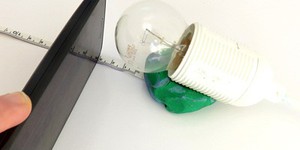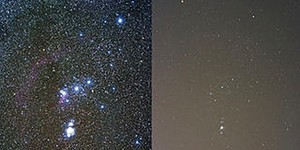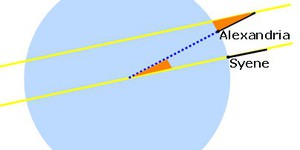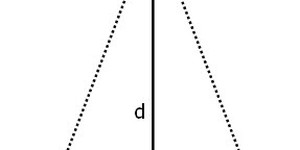High School, Observe Astronomy with Your Own Tools Science Projects (8 results)
Explore astronomy by going outside for hands-on experiments with tools, such as a telescope, light meter, or a digital camera. With these measurements, make graphs or do geometry to find the brightness of the moon, the size of the earth, or more.
|
Have you ever looked up at the stars at night and wondered how fast they were moving or how far away they were? By studying how the brightness of a star changes with distance, you can answer those questions. In this astronomy science project, you'll create a model of starlight and use a sensor app with your smartphone to discover the key relationship between brightness and distance.
Read more
Featured
Have you heard that garlic powder is supposed to inhibit the growth of bacteria? Which do you think would make a better disinfectant: a solution of garlic powder or a solution of bleach? This project shows you a straightforward way to compare the effectiveness of different disinfectants (or other antimicrobial agents), by measuring zones of inhibition on a culture plate.
Read more
This is a great project for someone interested in both stargazing and photography. Bright city lights and even the light of the full Moon obscure the dimmest stars, which can make identifying constellations more difficult. In this astronomy science project, you will calibrate a digital camera to measure the skyglow in different locations. This can be a great tool to comparing the quality of different star viewing locations.
Read more
New
Drones are small, fast, and maneuverable - this can make them very hard to knock down! Check out this Mark Rober video where he explores both how professional defense companies and some backyard YouTube engineers tackle the problem of knocking drones out of the sky. Can you take this engineering challenge on yourself? What methods can you devise to take down a drone? Which one works the best?
Drones can be expensive, and you probably do not want to risk damaging a $1,000 drone for your science…
Read more
For an advanced science fair project, you can build your own telescope and learn how to use it to make observations of the night sky. Can you make your own observations to determine the orbital period of Jupiter's major moons?
The Dobsonian telescope, first built and popularized by astronomer John Dobson, is considered to be the best bang-for-your-buck if you want to build a good amateur telescope. The smaller the telescope's aperture the less expensive to build, but also the less…
Read more
How big a ruler would you need to measure the circumference of the Earth? Did you know that you can do it with a yardstick? (And you won't have to travel all the way around the world!)
Read more
Here's an astronomy project idea from Dr. James Pierce, a professor in the Astronomy Program at Minnesota State University, Mankato: "Determine the length of twilight at different times of the year by observing the time at which certain bright stars first appear and comparing with the sunset time. Beware of variations due to stars appearing at different altitudes. Try using Polaris as a standard. Also note the time at which automatic streetlights turn on. Determine how soon after sunset stars…
Read more
New
Remembering to take medicine at the right time can be hard, especially if you need to take multiple medications at different times of day. It might not be a big deal if you forget to take your daily multivitamin, but for some people, forgetting to take medication at the right time can be dangerous. What if you had a device that could not only set off an alarm at the right time, but also automatically dispense the right pills for you? In this project, you will build an automatic medicine…
Read more
Some claim the Moon appears larger when near the horizon. Make a series of observations of the Moon, measuring the Moon's angular diameter each time. You should also note the Moon's altitude above the horizon, and the Moon's phase. You should do background research on the lunar orbit to determine the necessary time period. Do you find predictable variations in the Moon's diameter? Can you relate this to the Moon's changing distance from Earth? From your data, try to determine when apogee and…
Read more
Let's suppose you can take advantage of the Internet and get a 'pen pal' located a 1000 miles away in another city. On the same night, and at EXACTLY the same time 'Universal Time', make a CAREFUL observation of where the Moon is located with respect to the background stars. You should be able to discern a slight (about 1/2 the Moon's diameter) shift in position due to parallax. Then, with a little geometry, you could estimate the distance of the Moon during the full lunar cycle (Odenwald,…
Read more
Want to stretch your imagination? One good way is to try to imagine how far it is to a distant star. How much farther away is it than the moon is from the earth? How much farther away than the earth is from the sun? How long would it take to get there? In this project, you'll learn one way of measuring the distance without leaving Earth.
Read more
|
Explore Our Science Videos
How Train Wheels Stay On Track - STEM activity
Write Secret Messages With Invisible Ink!
Build a Mini Trebuchet












